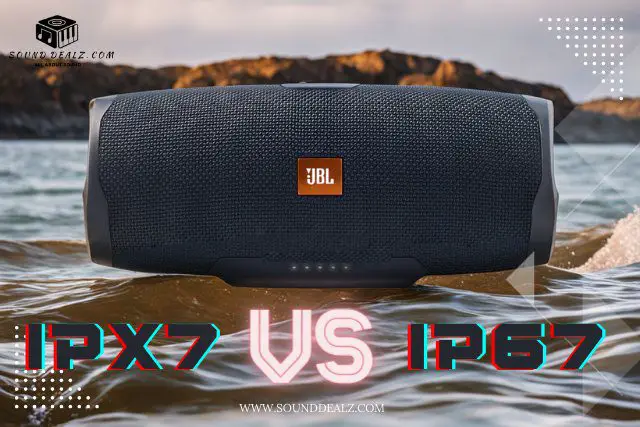If you are confused between IPX7 vs IP67. Then this article explains these codes and helps you to pick a better product. When you looked at the IP number on the box, you thought, “What is the meaning of this IP number?”
Every electronic item on the market has an IP number. Devices may have different IP grades, which are important for understanding that how long they will last and how well they work.
This article will explain what IP ratings are and why they’re important in the tech world. It will also compare IPX7 and IP67 to help you choose which is best for your needs.
What is IP Rating?

An IP rating, or Ingress Protection rating, is a way of classifying the degree of protection provided by an electrical enclosure against intrusion from foreign bodies and moisture. IP ratings are defined in the international standard IEC 60529 (British BS EN 60529:1992, European IEC 60509:1989).
IP ratings are composed of two digits. The first digit indicates the degree of protection against solid objects, such as dust and dirt. While the second digit indicates the degree of protection against liquids, such as water and rain.
The higher the number, the better the product has better protection against liquids and dust.
IP ratings are important for a variety of reasons. For example, if you are using an electronic device in a dusty environment, you will need to choose a device with a high IP rating for dust protection. Similarly, if you are using an electronic device in a wet environment, you will need to choose a device with a high IP rating for water protection.
IP ratings are also important for safety reasons. For example, if an electrical enclosure is not properly sealed, dust and moisture can enter and cause a short circuit or other electrical hazard.
IPX7

IPX7 is an IP rating that indicates the level of protection provided by an electrical enclosure against water ingress. IPX7 devices are protected against immersion in water up to 1 meter deep for up to 30 minutes. It means that the device can withstand being submerged in water for a short period of time without being damaged.
IPX7 devices are not completely waterproof, but they are very water-resistant. They can be used in a variety of wet environments, such as rain, snow, and even pools and lakes. However, it is important to note that IPX7 devices are not designed to be used in salt water or other corrosive liquids.
IP67

IP67 is an Ingress Protection (IP) rating that indicates the level of protection provided by an electrical enclosure against dust and water ingress.
The first digit of the IP rating, 6, indicates that the enclosure is dust-tight. This means that no dust can enter the enclosure, even in the smallest amounts.
The second digit of the IP rating, 7, indicates that the enclosure is protected against immersion in water up to 1 meter deep for up to 30 minutes. This means that the device can withstand being submerged in water for a short period of time without being damaged.
IP67 devices are a versatile and durable option for a wide range of applications. If you need a device that can withstand the elements, an IP67-rated device is a good choice.
IPX7 vs IP67: Which Product is Better to Buy?
| Feature | IPX7 | IP67 |
|---|---|---|
| Water protection | Yes | Yes |
| Dust protection | No | Yes |
| Immersion depth | Up to 1 meter for up to 30 minutes | Up to 1 meter for up to 30 minutes |
| Suitable for | Wet environments | Wet & Harsh environments |
| Examples of products | Smartphones, smartwatches, fitness trackers, Bluetooth speakers, portable cameras, headphones | Smartphones, smartwatches, fitness trackers, Bluetooth speakers, portable cameras, headphones, outdoor lights, power tools, industrial machinery |
On the basis of above-mentioned comparison between IPX7 vs IP67. There is a key difference between the two ratings is IPX7 only protects against water, while IP67 protects against both water and dust.
If you only need a device that is protected against water, then an IPX7 device is a good option. However, if you need a device that is protected against both water and dust, then an IP67 device is a better choice.
FAQs
Which is better IP67 or IPX7?
IP67 is better than IPX7 because it offers protection against both dust and water, while IPX7 only offers protection against water.
Which is better IPX7 or IP68?
IP68 is better than IPX7 because it offers a higher level of water protection. IPX7 devices are protected against immersion in water up to 1 meter deep for up to 30 minutes, while IP68 devices can withstand immersion in water deeper than 1 meter for longer periods of time.
Is IPX7 fully waterproof?
No, IPX7 devices are not fully waterproof. They are water-resistant, but they can still be damaged if they are submerged in water for too long or if they are exposed to high-pressure water.
What is better than IP67?
IP68 is better than IP67 because it offers a higher level of water protection. IP69K is also better than IP67 because it offers protection against dust and high-pressure, high-temperature water sprays.
Final Words
After reading this article, now you have a clear idea about the difference between IPX7 vs IP67 ratings.
If you need a device for indoor use, then an IPX7 grade will be the best choice for you.
On the other hand, if you want to take your device with you on outdoor trips or other adventures, then an IP67 grade is the best option.
An IP number tells you a lot about how long a product will last, so it’s an important thing to think about when you’re buying something. Take help from this guide and let us know what you think and what you’ve done with IP scores.
Related Post: IPX4 vs IP55-IPX5-IPX7-IP67-IP44-IP24-IP78 | Ratings Comparison

